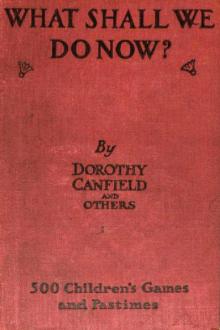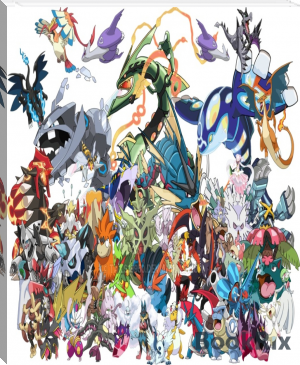What Shall We Do Now? by Dorothy Canfield Fisher (books on motivation .TXT) 📖

- Author: Dorothy Canfield Fisher
- Performer: -
Book online «What Shall We Do Now? by Dorothy Canfield Fisher (books on motivation .TXT) 📖». Author Dorothy Canfield Fisher
This game can be played by any number, either with a home-made pack or with ordinary playing cards from which three of the queens have been taken away; the remaining queen being the old maid. The cards are then dealt and each player first weeds out all pairs, such as two knaves, two aces, two fives, and so on. All having done this, the player who begins offers her hand, with the cards face downward, to her neighbor, and her neighbor takes one. She then looks through her cards to see if it pairs with any that she already has, and, if it does, throws the pair on the table. Having finished her examination she offers her cards in the same way to the next player, and so it goes on. As the possessor of the old maid card is, at the end, the loser of the game, each one who gets it does all in her power to induce the next player to take it. As the cards get fewer and fewer the excitement grows and grows.
"Old Bachelor" is played in the same way, except that three of the kings are then thrown out.
Pig"Pig" is a very noisy game. It is played with ordinary cards, unless you like to make a "Pig" set, which would be very easy. Having discovered how many persons want to play, you treat the pack accordingly. For instance, if five want to play you throw out all cards except five sets of four; if six, or three, you throw out all cards except six sets of four or three sets of four. Thus, if five were playing, the cards might consist of four aces, four twos, four threes, four fours, and four fives; or, if you began at the other end, four kings, four queens, four knaves, four tens and four nines. The cards are shuffled and dealt round, four each, and the game is for each player to complete a set of four. You do not, as in "Old Maid," select one from the cards that are offered, face downward, but each player hands whatever card he likes to the next player, who is bound to accept it. Directly a player has a set of four complete he lays the cards on the table, either very stealthily or with a bang, whichever he likes. Immediately a set is laid on the table (or directly the other players notice it) all other cards have to be laid there, too. The player who is last in laying them down is Pig. The game is played for as many rounds as you like, the player who was last the fewest times being the winner. The word Pig alters with each round. The last player to lay down his cards in the second round is not merely Pig, but Little Pig; in the third, Big Pig; in the fourth, Mother (or Father) Pig; in the fifth, Grandmother (or Grandfather) Pig; in the sixth, Ancestral Pig; in the seventh, Venerable Pig; in the eighth, Primeval Pig; in the ninth, Crackling.
Prophecies and CharacteristicsThis is a memory game and a very amusing one. It is played with two packs of cards of any sort. One pack is laid in a heap, face down, in the middle of the table. The other pack is distributed to the players, who lay them face upward in rows; each person should not have more than twelve cards since it is practically impossible to remember more than that number. Any one can begin by giving either a prophecy or a characteristic—thus: "Who will inherit a fortune inside a year?" or "Who will be the first in the room to wear false teeth?" at the same time turning up a card from the centre pile. Whoever has the card matching this, takes it, lays it face down on his card repeating the prophecy, "I will be the first to wear false teeth." The next in turn gives a characteristic, "Who has the worst temper?" or "Who has the most unselfish disposition?" This process continues around, until all the centre cards are matched. Then the memory test comes in. Every player in turn tries to remember and repeat all the prophecies and characteristics which have fallen to his share, giving them aloud in rapid succession. He is allowed for deliberation on any one only the time while ten is being counted. The one who remembers the greatest number is the winner.
The Old Maid's BirthdayThis game is utterly foolish, but it can lead to shouts of laughter. It has been founded on an old-fashioned card game called "Mr. Punch." The first thing required is a pack of plain cards on which should be written the names of articles of food and clothing, household utensils, and other domestic and much advertised things: such, for example, as a frock-coat, a round of beef, a foot-warmer, a box of pills. A story, somewhat on the lines of that which follows, must then be prepared and copied into a note-book. The company take their places and the cards are handed round. These should be held face downward. When all is ready one of the players reads the story, pausing at each blank for the player whose turn comes next to fill it in by calling out whatever is on his uppermost card. No matter how often the game is played (provided the cards are re-shuffled) the unexpected always happens, and it is usually so absurd as to be quite too much for a room all ready for laughter. The number of blanks in the story should be equal to the number of cards, and in order that the story may run on smoothly it is well for the next player always to glance at his top card just before his turn, so as to bring it out readily and naturally. The following story, which makes provision for nearly fifty cards, should be found serviceable until a better and more personal one is written. It will add to the amusement if the player who reads it substitutes the names of real shops and, if he likes, real people:
Attention. It was Miss Flitters's birthday, and she woke with a start and hurried down to see what the postman had brought. There were five parcels and a letter. The letter was from Miss Bitters. "Dear Miss Flitters," it ran, "I am so sorry to hear of your cold, and in the hope that it will do you good, I am sending you a ——. I always find it excellent, although mother prefers ——. We both wish you many happy returns of the day." The other presents were, from Miss Ditters a handsome ——, from Miss Glitters a delicate ——, and from Miss Hitters a particularly refined ——. "Dear me!" said Miss Flitters, "what a useful gift! just exactly what I wanted." She then sat down to breakfast, which, this being a special day, consisted of ——. "I did my best to do it to a turn," said the cook, as she laid it on the table with her own hands. "Mary said as how you'd prefer a ——, but, bless your 'eart, Miss Flitters, I know your tastes best." "You do, indeed," said Miss Flitters. "The thing is perfectly cooked. It's delicious. It reminds me of ——. To-day," she added, "I am giving a party, and I want you to let us have a very charming meal. I will get the things directly after breakfast. What do you think we shall need?" "Well, ma'am," said the cook, "you may please yourself about everything else, but we've done without a —— for so long, that I must have one." "Quite right," said her mistress.
She then prepared for going out; and seeing that it looked like rain, took a —— from the cupboard and on her head tied a ——. "Bless your 'eart, mum," cried the cook, "you've forgot your smelling salts. Suppose you was to feel faint—what then? Never mind," she added, "this'll do just as well"—handing her a ——. Miss Flitters hurried off at such a pace that she ran right into the minister. "I beg your pardon," she exclaimed, "I mistook you for a ——." "May I come with you?" asked the minister. "Most certainly," said Miss Flitters.
They went first to Buszard's for a ——, and selected two particularly juicy ones. Then to Marshall and Snelgrove's for a ——. "Is this for the complexion?" asked the minister, picking up a —— from the counter. "La, sir," said Miss Flitters, "how little you know of domestic life!" Then they went to Fuller's for a ——, and to Jay's for a ——. "It's too dear," said Miss Flitters. "Give me a —— instead." At the stores they inspected ——. "Haven't you anything fresher?" asked Miss Flitters: "I'd as soon buy a ——." None the less she bought two and slipped them into her reticule, adding as a little gift for the cook a ——.
The party began at six o'clock. The first to come was Miss Kitters. "You don't mind my bringing my work, I know, dear," she exclaimed; "I'm embroidering a —— for the natives of Madagascar, and it must be done soon." Miss Litters came next, and being rather short-sighted, sat down on a ——. "Never mind," said Miss Flitters. "Oh, I don't," she replied, "but it would have been more comfortable if it had been a ----." Miss Mitters came just as the clock struck. She was wearing a charming —— trimmed with ——. "What perfect taste she has!" the others murmured. Miss Nitters followed. Miss Nitters was the exact opposite of Miss Mitters in all matters relating to dress. She had no taste at all, and was wearing merely a —— with pompons attached, and in place of earrings a couple of ——. "So fast!" whispered Miss Litters. Miss Pitters, Miss Ritters, and Miss Titters each brought a present. Miss Pitters's present was a silver-plated ——. "So useful for the toilet table," she said. Miss Ritters's was a Japanese ——, a piece of exquisite workmanship; while Miss Titters produced from her pocket a brown paper parcel which turned out to contain a very choice ----, an heirloom in the Titters family for centuries. "I didn't know whether to bring this or a ——," she said; "but father decided me. Father always knows best."
When all were assembled, the guests sat down to supper. But here an awkward thing happened. "If you please, mum," the cook was heard to whisper in a loud voice, "the —— hasn't come. Shall I get a —— instead?" "Yes," said Miss Flitters, "that will do very well. Don't you think so, Miss Pitters?" "I think," was the reply, "I should prefer ——." It was none the less an excellent and generous repast. Opposite Miss Flitters was a noble ——, flanked by a —— and a ——. At the foot of the table was a dish of ——. "I never tasted anything so delicious in my life," said Miss Mitters, taking a large helping of ----. "Oh!" said Miss Glitters, "you should try the ——. It's yumps." The first course was followed by sweets, the most imposing of which was a wonderful frosted —— with Miss Flitters's name in pink sugar. "You must all have a piece," said the hostess, "but I'm afraid it's rather rich."
After supper came games, "Blind Man's Buff" and "Hunt the Slipper," but as no one cared to lend a slipper, they used instead a ——, and





Comments (0)